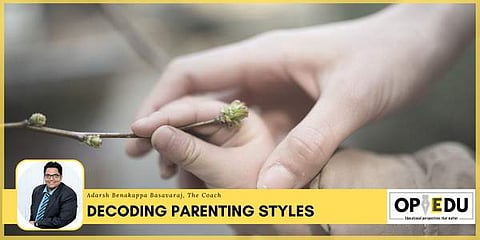

Every parent wants what's best for their child(ren) and to ensure that they see their wish through, a few parents take it too far which was clearly illustrated in the incident that took place in Bengaluru which warranted police involvement.
In the last decade of my clinical and coaching experience, I've dealt with many types of parents and the one commonality that exists among them all is that one instinct that is the foundation, or rather ROOT CAUSE, for all the other behaviours that stem from it with regard to their kids, PROTECTIVE INSTINCT. This is quite natural and is present in both humans and animals as well.
The reason I talk so much about this instinct is simply to emphasise that it is these instincts that dictate, determine and are responsible for the degree of involvement of a parent in the child's life. But, how much is too much?
Helicopter parents — hovering above way too much!
This term was coined as it makes a lot of sense. Helicopter parents are those who are very intrusive and are often not only accused of constantly invading privacy but also known for taking decisions on the behalf of their offspring.
The term helicopter parents is actually generalised. If we dig deeper, there are actually three different types of helicopter parents. But let me focus on the two which one should avoid becoming. Hence, this explanation of the characteristics should also serve as a checklist for you, as a parent, to refrain from exhibiting such behaviours or to simply become aware and understand if you have a tendency to get carried away.
Low-altitude helicopter parents
Low-altitude helicopter parents are the ones who fly under the radar. They ensure that they are visible and are known to be the child's representation everywhere. They tend to follow behaviours like:
1. Trying to submit homework, projects and assignments regularly in an attempt to position themselves between the teacher and the child or trying to interact with teachers, more times than required, by either drumming up excuses or forcibly trying to advocate for better marks or grades.
2. Focused on trying to find a reason to ensure that the child gets preferential treatment
3. Trying to establish a rapport by any means necessary directly, in an attempt to sway teachers in their direction or to favour the child. In simple terms trying to create an invisible atmosphere of ENTITLEMENT for the child.
Guerrilla warfare helicopter parents
These parents are more aggressive than the low-altitude ones and are more aggressive in their tactics. They're warriors who are ready to even fight battles to ensure that they feel that they're doing the best for their li'l ones. They not only represent their children but often act as their bodyguards.
1. They may do the homework of their kids in an attempt to ensure that their kid comes across as the smartest. They may then submit the same and question the teachers as to why their child's assignment, project or homework wasn't given the highest grade or appreciation.
2. They ensure that their children get preferential treatment by using clout, and influence in any form necessary. The parents who belong to this category even have a tendency to use manipulation as a method.
3. Forget rapport, parents might even go to a level of instilling fear in teachers and other parents to ensure that their child is placed on a pedestal. They may attend their child's job interview (or at least attempt to do so) or contact a hiring manager to negotiate the terms of the offer.
There is much more to discuss but due to the limited space, I've made an attempt to do my best. There are many parenting styles and it is definitely subjective. Apart from being subjective, it is also situational. Keeping it simple, the best thing to do is to refrain from exhibiting the above behaviours. Why? Well, my simplest answer would be, the more equalised the environment, the more learning that your child is exposed to in all aspects, be it emotional, spiritual, rational or intellectual.
Nature is the best teacher, they say... hence, let us protect our children from harm, but not try to compete with nature and create harm.
With Regards,
Adarsh Benakappa Basavaraj
"Your Coach"
